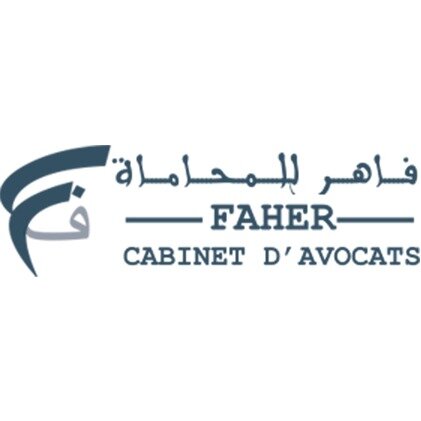Best Social Security Lawyers in Morocco
Share your needs with us, get contacted by law firms.
Free. Takes 2 min.
Or refine your search by selecting a city:
List of the best lawyers in Morocco
About Social Security Law in Morocco
Social Security in Morocco is a crucial aspect of the social welfare system, aimed at providing financial and social protection to its citizens. The system is managed by the National Social Security Fund (CNSS), which oversees various benefits such as pensions, health insurance, maternity benefits, family allowances, and unemployment benefits. These measures are in place to ensure that citizens have access to essential services and support throughout their lives, especially during times of need.
Why You May Need a Lawyer
Seeking legal advice in Social Security matters can be essential in several situations. Common scenarios include disputes over eligibility for benefits, issues with improper calculation of benefits, delays in receiving payments, challenges in claiming disability benefits, or if you have been unfairly denied benefits. Additionally, if you are an employer navigating the obligations of Social Security contributions, a lawyer can offer guidance. Legal assistance can help you understand your rights and ensure that you receive or fulfill social security obligations in accordance with Moroccan law.
Local Laws Overview
Moroccan Social Security laws are primarily governed by the Law No. 1-72-184, passed in 1972, which has undergone several amendments to adapt to the evolving needs of society. Key aspects include mandatory insurance for salaried workers, contribution requirements based on salary brackets, and a comprehensive framework for maternity, old-age, and disability benefits. Employers are required to register their employees with the CNSS and both parties are responsible for contributing to the fund. Non-compliance can result in penalties.
Frequently Asked Questions
1. Who is eligible for Social Security benefits in Morocco?
Eligibility generally includes salaried employees registered with the CNSS, but may also extend to self-employed individuals and professionals under certain conditions.
2. How are Social Security contributions calculated?
Contributions are calculated as a percentage of the employee’s salary, with both employers and employees making contributions. These percentages may vary depending on the type of benefit being contributed to.
3. What types of benefits are available under the Moroccan Social Security system?
Available benefits include health insurance, pensions, maternity leave, family allowances, and unemployment benefits.
4. How can I resolve a dispute regarding Social Security benefits?
You can file a claim or appeal to the relevant department within the CNSS, or seek legal assistance to mediate or represent your interests in disputes.
5. Can foreigners benefit from Moroccan Social Security?
Yes, foreign employees who are registered with the CNSS are eligible to receive Social Security benefits.
6. What documents are needed to apply for Social Security benefits?
Required documents usually include identification, employment records, medical certificates for health-related claims, and other pertinent documentation depending on the type of benefit.
7. How do self-employed individuals engage with Social Security in Morocco?
Self-employed individuals can voluntarily join the CNSS to gain access to social security benefits, subject to specific contribution requirements.
8. What is the process for retirement under the CNSS?
Employees need to have achieved the necessary contribution period and reached the stipulated retirement age to qualify for pension benefits. The process involves submitting an application to the CNSS.
9. What recourse do I have if my employer fails to register me with the CNSS?
You can file a complaint with the CNSS or the Labor Inspectorate; legal assistance might be necessary to claim your rights.
10. Are Social Security benefits taxable in Morocco?
Generally, benefits are not subject to income tax, but it is advisable to check specific regulations as they may change.
Additional Resources
The National Social Security Fund (CNSS) is the primary agent for social security matters; visiting their offices or website can provide more detailed information. It may also be beneficial to consult the Ministry of Labor and Professional Integration for broader employment law issues. Non-governmental organizations like the Moroccan Association for Human Rights (AMDH) can provide support and advice for those facing issues with Social Security.
Next Steps
If you require legal assistance in Social Security issues, consider consulting with a lawyer specializing in labor and social security law. Verify their experience in handling similar cases to ensure competent representation. You can contact the Moroccan Bar Association or visit local law firm directories for recommendations. It is crucial to gather all relevant documents and details of your case before seeking consultation, as this can enable your lawyer to offer more precise advice and strategies.
Lawzana helps you find the best lawyers and law firms in Morocco through a curated and pre-screened list of qualified legal professionals. Our platform offers rankings and detailed profiles of attorneys and law firms, allowing you to compare based on practice areas, including Social Security, experience, and client feedback.
Each profile includes a description of the firm's areas of practice, client reviews, team members and partners, year of establishment, spoken languages, office locations, contact information, social media presence, and any published articles or resources. Most firms on our platform speak English and are experienced in both local and international legal matters.
Get a quote from top-rated law firms in Morocco — quickly, securely, and without unnecessary hassle.
Disclaimer:
The information provided on this page is for general informational purposes only and does not constitute legal advice. While we strive to ensure the accuracy and relevance of the content, legal information may change over time, and interpretations of the law can vary. You should always consult with a qualified legal professional for advice specific to your situation.
We disclaim all liability for actions taken or not taken based on the content of this page. If you believe any information is incorrect or outdated, please contact us, and we will review and update it where appropriate.
Browse social security law firms by city in Morocco
Refine your search by selecting a city.

















